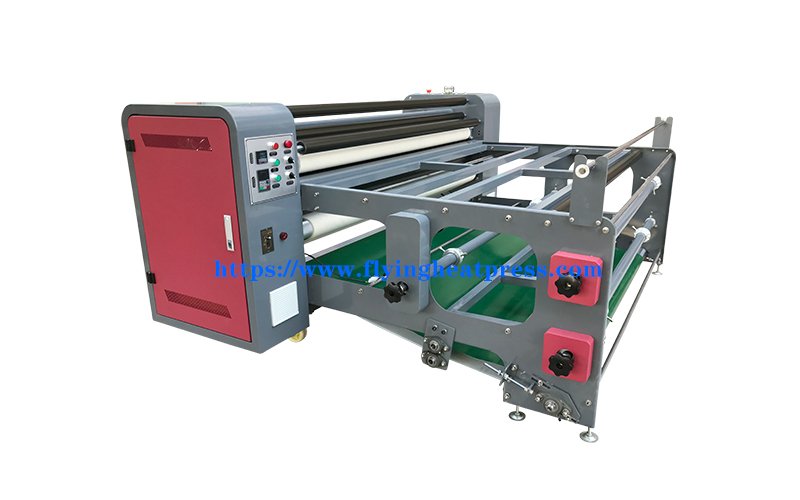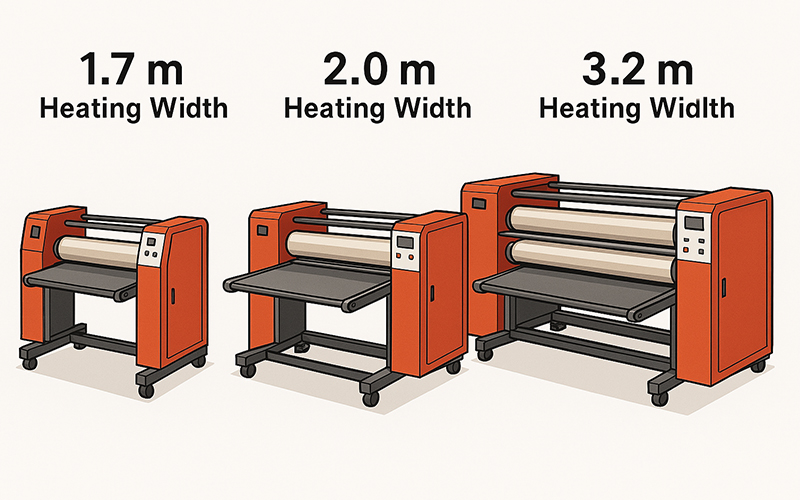Investing in a roller heat press machine is a major decision for any printing business, whether you're focused on sublimation printing, polyester fabric transfer, or large-scale apparel production. With the variety of machines available in the market, it can be overwhelming to decide which one suits your specific business needs. This comprehensive guide will walk you through the key factors to consider when choosing the right roller heat press machine.

Before comparing models and features, define your production goals:
Volume: Are you running small batches or 24/7 high-volume production?
Material types: Do you print on polyester fabric, ribbons, flags, banners, curtains, or other materials?
Product formats: Are you printing roll-to-roll, sheet-to-roll, or piece-by-piece?
Target industries: Sportswear, home textiles, promotional products, or fashion?
Clarifying these aspects helps determine the required machine size, durability, and configuration.
The width of your industrial heat press machine determines what size of fabric or paper you can handle. Common heating widths include:
1.7 meters (67 inches): Ideal for sportswear sublimation and ribbon printing
2.0 meters (79 inches): Suitable for most garment and flag production
2.6 meters (102 inches): Great for medium-width curtains and signage
3.2 meters (126 inches): Best for wide-format sublimation heat press printing like bedsheets, banners, and home decor
Choosing a heating width that aligns with your sublimation transfer paper and fabric roll size minimizes waste and improves efficiency.

The heating system directly impacts transfer quality and energy efficiency.
Oil Drum Heating:
Provides stable and uniform temperature
Ideal for long production runs
Better energy efficiency over time
Common in industrial-level machines
Electric Heating:
Heats up quickly
Suitable for light or intermittent use
May have temperature fluctuations on larger drums
If you're producing continuously or working with roll-to-roll sublimation, an oil drum heating system is the better choice.

Drum diameter affects how long the substrate remains in contact with the heated surface:
| Drum Size | Recommended For |
|---|---|
| 210mm | Small-scale use, ribbons, lanyards |
| 420mm | Balanced performance, general use |
| 600mm | High-speed industrial applications |
Larger drums provide longer contact time, allowing better ink absorption and color penetration—especially important for thick fabrics or deep colors.
Look for machines equipped with digital PID controllers that allow precise adjustment of:
Temperature (in Celsius or Fahrenheit)
Belt speed (meters per minute)
Pressure settings
This ensures consistent performance and reduces defects during production. Some advanced machines offer programmable presets for different materials.
Safety is crucial for operators working with high-temperature equipment. Recommended safety features include:
Emergency stop button
Anti-hand safety guard
Overheat protection
Auto-shutoff when idle
Blanket centering and tension control
Automation options like auto feeding, rewinding, and fabric return systems can also boost efficiency
Verify your facility's power supply and choose a machine compatible with:
Single-phase (220V) for small-scale machines
Three-phase (380V) for industrial models
Ensure proper grounding and wiring according to your local regulations. Some suppliers offer dual-voltage or custom setups.
If you require special drum sizes, frame colors, branded logos, or unique feeding tables, look for a manufacturer that offers:
OEM/ODM customization
Spare parts supply
Installation guidance (video or on-site)
Long-term technical support
A reliable supplier will support your growth, not just the sale.
Don’t just compare the machine price—consider long-term factors like:
Power consumption
Maintenance costs
Downtime risk
Lifespan of components (e.g., heating element, felt belt)
Upgrade options
Spending a little more on a high-quality machine may save significant money and headaches in the long run.
Choosing the right roller heat press machine isn’t just about price—it's about compatibility with your production goals, material types, and quality standards. Whether you're printing on flags, garments, curtains, or ribbons, the right combination of width, drum size, heating method, and automation features will help you scale efficiently.
If you're unsure which model is right for your business, reach out to Flying today. We're here to offer expert guidance, OEM solutions, and global support for all your heat press needs.
Contact: Lynne
Phone: +86 135 3266 0169
E-mail: info@flyingheatpress.com
Whatsapp:8613532660169
Add: No.25 Junda Middle Road , Dongkeng Town , Dongguan City , Guangdong Province , China ,523445
We chat
